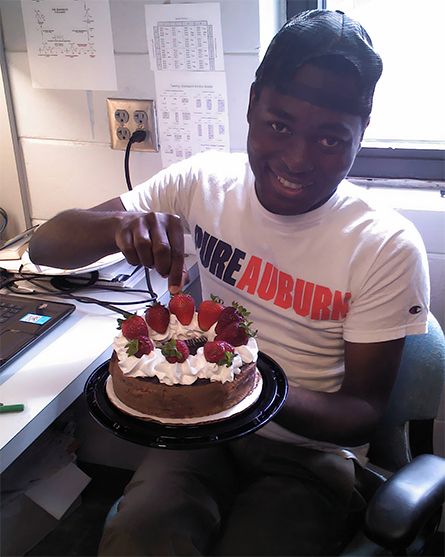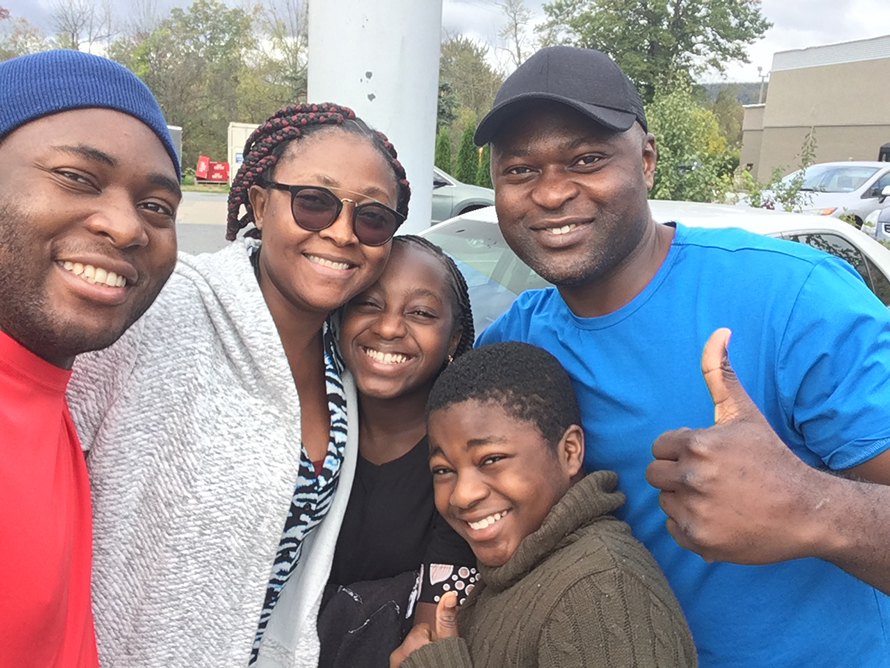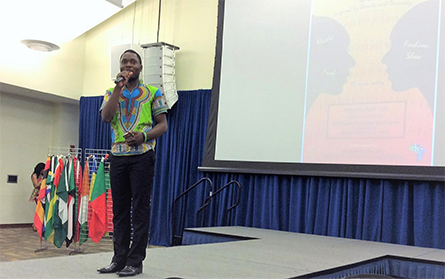
Always in a hurry
Growing up, I was fascinated by science. I posed an unending string of questions: Why can’t I see plants growing? Why can’t humans fly like birds? My older siblings tried to answer me with the knowledge they’d gained in their middle and high school science classes. This only spurred my interest further.

strawberries at his study bench.
When I was in Form 1 (equivalent of seventh grade in the U.S.), I’d visit my brother at his high school, where he was in the S1 series (one of the science cores in Cameroon’s anglophone educational system). We were both in the Bilingual Grammar School, also referred to as Lycée Molyko, in the city of Buea. The huge textbooks and complex mathematical equations on the blackboard intimidated me. Sometimes, the only things I could make sense of were the letters x and y and the numbers 0-9. Other symbols looked like an elongated S or a version of the letter d. I wondered if one day I’d be able to understand them.
My siblings were comfortable solving complex mathematical equations, so I knew with hard work I’d find myself in S1 too. Years passed, and there I was in high school, enrolled in biology, chemistry, pure mathematics with mechanics, further mathematics, and physics. Physics, chemistry and biology were my favorite classes. After high school, I spent three years at the University of Buea as a microbiology major. It was vastly different from high school. The wake-up call was my first exam in general chemistry. I realized I had to buckle down and focus. In 2010, I graduated with a Bachelor of Science and decided to pursue a terminal degree in the U.S.
Crossing the Atlantic and landing in Georgia, I was greeted by warm Atlanta weather. But for the humidity, it felt just like home. Driving from the airport, I looked around and wondered, “Where are all the skyscrapers?” I had hoped my views would be flooded with skyscrapers on the drive to Auburn University. I convinced myself it must be the route the driver took to avoid traffic. Aren’t there skyscrapers at every corner in every city in the U.S.?

The shock didn’t end there. Arriving on campus the next day, I was astonished to see how casually dressed the students were. In the culture I was used to, if you’re caught dressed in basketball or soccer shorts or shorts way above knee length, you’re asked to go home and not return until you’ve changed your clothes.
The dress code wasn’t the only difference. The phrase “free food” always seemed to be in the air and in every ad I read. I couldn’t wrap my head around why anyone would have to include that in an ad. In Cameroon, if you invite someone to a meeting or event, it is customary to provide food for them — free. Thus, whenever someone tried inviting me to an event and mentioned free food, I quipped, “I would attend even sans free food.”
As a graduate student and a teaching assistant, I learned more about American culture and the educational system. As an undergrad in Cameroon, I’d have one exam that was 30% of my final grade and a cumulative final exam that was 70%. My pals and I would joke that there was very little room for error.
In the U.S., I was introduced to a system with multiple tests and then (maybe) a final exam. In my three undergraduate years, I could never opt out of a final exam — it was 70% of my grade. With multiple exams throughout of the semester, I learned it was possible to skip the final.

when he was president of the association.
My graduate admission letter stated that the Auburn University chemistry program takes about four years to complete. As a new and ambitious grad student, I walked into my graduate advisor’s office and told him I planned to be done in three. He ran through a myriad of facial expressions. Then he bit his pen for a second. He was probably saying to himself, “Just you wait — you’ll find out.”
By my third year of grad school, I was nowhere near graduation. But I had made significant progress and was already a Ph.D. candidate. My ambition and drive paid off. In the fall semester of my fourth year, I had job offers from industries and various academic and research organizations.
Looking back, I don’t regret pushing myself to be done in three years. I’ve always had what I term the sprinter’s attitude — run as fast as you can in as short a time as possible and get it done. I am a first-generation faculty member in large part because I’m always in a hurry.
Enjoy reading ASBMB Today?
Become a member to receive the print edition four times a year and the digital edition monthly.
Learn moreFeatured jobs
from the ASBMB career center
Get the latest from ASBMB Today
Enter your email address, and we’ll send you a weekly email with recent articles, interviews and more.
Latest in Opinions
Opinions highlights or most popular articles

Sketching, scribbling and scicomm
Graduate student Ari Paiz describes how her love of science and art blend to make her an effective science communicator.

Embrace your neurodivergence and flourish in college
This guide offers practical advice on setting yourself up for success — learn how to leverage campus resources, work with professors and embrace your strengths.

Survival tools for a neurodivergent brain in academia
Working in academia is hard, and being neurodivergent makes it harder. Here are a few tools that may help, from a Ph.D. student with ADHD.

Hidden strengths of an autistic scientist
Navigating the world of scientific research as an autistic scientist comes with unique challenges —microaggressions, communication hurdles and the constant pressure to conform to social norms, postbaccalaureate student Taylor Stolberg writes.

Black excellence in biotech: Shaping the future of an industry
This Black History Month, we highlight the impact of DEI initiatives, trailblazing scientists and industry leaders working to create a more inclusive and scientific community. Discover how you can be part of the movement.

Attend ASBMB’s career and education fair
Attending the ASBMB career and education fair is a great way to explore new opportunities, make valuable connections and gain insights into potential career paths.

